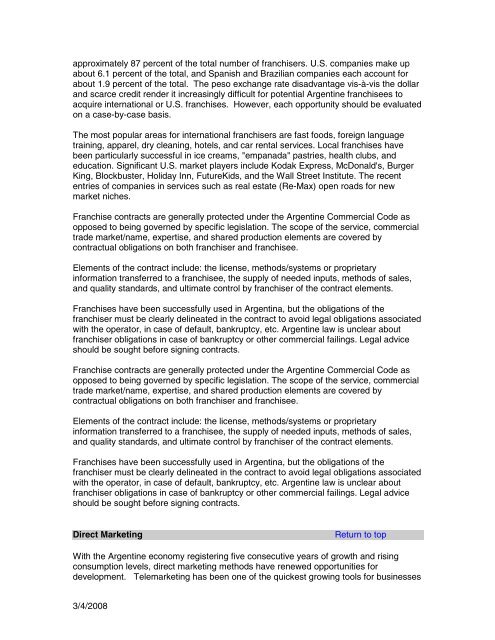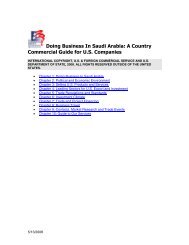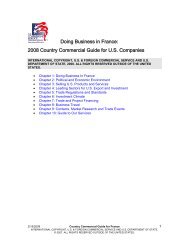Create successful ePaper yourself
Turn your PDF publications into a flip-book with our unique Google optimized e-Paper software.
approximately 87 percent of the total number of franchisers. U.S. companies make up<br />
about 6.1 percent of the total, and Spanish and Brazilian companies each account for<br />
about 1.9 percent of the total. The peso exchange rate disadvantage vis-à-vis the dollar<br />
and scarce credit render it increasingly difficult for potential Argentine franchisees to<br />
acquire international or U.S. franchises. However, each opportunity should be evaluated<br />
on a case-by-case basis.<br />
The most popular areas for international franchisers are fast foods, foreign language<br />
training, apparel, dry cleaning, hotels, and car rental services. Local franchises have<br />
been particularly successful in ice creams, "empanada" pastries, health clubs, and<br />
education. Significant U.S. market players include Kodak Express, McDonald's, Burger<br />
King, Blockbuster, Holiday <strong>In</strong>n, FutureKids, and the Wall Street <strong>In</strong>stitute. The recent<br />
entries of companies in services such as real estate (Re-Max) open roads for new<br />
market niches.<br />
Franchise contracts are generally protected under the Argentine Commercial Code as<br />
opposed to being governed by specific legislation. The scope of the service, commercial<br />
trade market/name, expertise, and shared production elements are covered by<br />
contractual obligations on both franchiser and franchisee.<br />
Elements of the contract include: the license, methods/systems or proprietary<br />
information transferred to a franchisee, the supply of needed inputs, methods of sales,<br />
and quality standards, and ultimate control by franchiser of the contract elements.<br />
Franchises have been successfully used in <strong>Argentina</strong>, but the obligations of the<br />
franchiser must be clearly delineated in the contract to avoid legal obligations associated<br />
with the operator, in case of default, bankruptcy, etc. Argentine law is unclear about<br />
franchiser obligations in case of bankruptcy or other commercial failings. Legal advice<br />
should be sought before signing contracts.<br />
Franchise contracts are generally protected under the Argentine Commercial Code as<br />
opposed to being governed by specific legislation. The scope of the service, commercial<br />
trade market/name, expertise, and shared production elements are covered by<br />
contractual obligations on both franchiser and franchisee.<br />
Elements of the contract include: the license, methods/systems or proprietary<br />
information transferred to a franchisee, the supply of needed inputs, methods of sales,<br />
and quality standards, and ultimate control by franchiser of the contract elements.<br />
Franchises have been successfully used in <strong>Argentina</strong>, but the obligations of the<br />
franchiser must be clearly delineated in the contract to avoid legal obligations associated<br />
with the operator, in case of default, bankruptcy, etc. Argentine law is unclear about<br />
franchiser obligations in case of bankruptcy or other commercial failings. Legal advice<br />
should be sought before signing contracts.<br />
Direct Marketing Return to top<br />
With the Argentine economy registering five consecutive years of growth and rising<br />
consumption levels, direct marketing methods have renewed opportunities for<br />
development. Telemarketing has been one of the quickest growing tools for businesses<br />
3/4/2008












